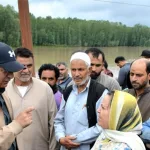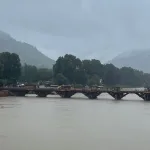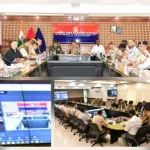FACT CHECK
The abrogation of Article 370 and 35A in Kashmir marked a significant turning point in the region’s history. For three decades, Kashmir had been plagued by terrorism, with frequent hartals, stone pelting incidents, and terror attacks disrupting the everyday lives of its residents. However, following the abrogation, a remarkable transformation occurred. Terrorism in Kashmir seemingly vanished, giving way to a newfound era of peace and stability. This article delves into the impact of this historic decision, exploring the disappearance of terrorism, the end of hartals, the curbing of stone pelting incidents, and the dismantling of terror networks.
The decision to abrogate Article 370 and 35A
In a historic move, the Indian government decided to abrogate Article 370 and 35A on August 5, 2019. This decision effectively revoked the special status granted to Jammu and Kashmir and aimed to foster greater unity and development in the region. The move received mixed reactions, with some hailing it as a positive step towards integration, while others expressed concerns about the potential implications for the people of Kashmir.
Pre-abrogation scenario: Three decades of terrorism in Kashmir
For the past three decades, Kashmir has been plagued by terrorism, insurgency, and violence. The roots of this conflict can be traced back to the late 80s, when an armed insurgency against Indian rule erupted in the region. Separatist groups, backed by external forces, resorted to violence, leading to a cycle of unrest and bloodshed.
The impact of terrorism on Kashmir has been far-reaching. Innocent lives have been lost, infrastructure has been damaged, and the economy has suffered immensely. The constant threat of violence created an atmosphere of fear and instability, hindering the progress and prosperity of the people in the region. The ongoing conflict also strained relations between communities, causing deep divisions and animosity.
Impact of abrogation: The disappearance of terrorism in Kashmir
Since the abrogation of Article 370 and 35A, there has been a noticeable decline in terrorist activities in Kashmir. The number of terror attacks, stone pelting incidents, and insurgency-related incidents has significantly decreased. This shift has brought a sense of relief and hope among the people, who can now envision a future free from the constant shadow of violence.
Several factors can be attributed to the disappearance of terrorism in Kashmir. The increased presence and effectiveness of Indian security forces have played a crucial role in curbing terrorist activities. The government’s efforts to engage with the local population, address their concerns, and promote development initiatives have also contributed to creating an environment that is less conducive to extremism. Additionally, the abrogation of Article 370 and 35A has paved the way for a more integrated and inclusive society, fostering a sense of belonging and reducing the appeal of separatist ideologies.
End of Hartals: A new era of peace and normalcy
Hartals, or strikes, have been a regular occurrence in Kashmir during the tumultuous years of terrorism. These strikes often led to the shutdown of businesses, disruption of essential services, and loss of livelihood for the people. The cycle of violence and enforced closures perpetuated a sense of despair and stagnation, further exacerbating the challenges faced by the region.
With the decline in terrorism and the abrogation of Article 370 and 35A, Kashmir has entered a new era of peace and normalcy. The absence of hartals, stone pelting, and terror attacks has allowed people to resume their daily activities without fear and uncertainty. This transition presents an opportunity for the region to focus on development, economic growth, and the overall well-being of its residents. While challenges remain, this historic decision has created a foundation for unity, development, and integration, marking a turning point in the history of the region.
Curbing stone pelting: Addressing the root causes of unrest
Stone pelting has been a distressing problem in Kashmir for several years. While it is crucial to understand the underlying factors contributing to this form of protest, it is equally vital to approach the issue with sensitivity and empathy. Stone pelting is often a manifestation of deep-rooted grievances, including a sense of alienation, unemployment, and political discontent. It is essential to delve into these concerns to address the root causes of unrest and pave the way for lasting peace.
Since the abrogation of Article 370 and 35A, the situation in Kashmir has witnessed a significant transformation. The government has made commendable efforts to engage with the local population and create platforms for dialogue. By addressing the economic and social challenges faced by the people, including unemployment and lack of opportunities, steps are being taken to mitigate the causes of stone pelting and promote a more peaceful environment. While the road ahead may still be challenging, it is encouraging to see the commitment to long-term solutions and the willingness to engage in meaningful conversations.
Dismantling terror networks: The crackdown on militant activities
The abrogation of Article 370 and 35A has also had a significant impact on curbing terrorist activities in Kashmir. The government, in collaboration with security forces, has taken decisive steps to dismantle terror networks operating in the region. Through intelligence-based operations, targeted strikes, and enhanced border security, the Valley has seen a significant decline in terrorist infiltration and related incidents. These efforts have undoubtedly been instrumental in restoring a sense of security and stability to the region.
The impact of counter-terrorism operations
The operations conducted by security forces have dealt a severe blow to terrorist organizations in Kashmir. By neutralizing key operatives, cutting off their funding sources, and tightening security measures, these actions have disrupted the functioning of militant outfits. The decline in the number of terror attacks is a testament to the effectiveness of these operations and the commitment of security forces to safeguard the lives of Kashmiri civilians. While the threat of terrorism may not be entirely eliminated, the concerted efforts to dismantle these networks have undoubtedly made a significant difference.
The role of security forces: Ensuring peace and stability
The role played by security forces in preserving peace and stability in Kashmir cannot be overstated. They have worked tirelessly, often in challenging conditions, to protect both the locals and the region from external threats. The dedication and professionalism displayed by these forces have been pivotal in restoring a semblance of normalcy to Kashmir. It is important to acknowledge their contributions and support their ongoing efforts to create a secure environment that allows the people of Kashmir to live their lives without fear.
The collaboration between security forces and local authorities has been crucial in maintaining law and order in Kashmir. By working hand in hand, they have been able to address the concerns of the people, bridge the gap in communication, and build trust within the community. This partnership has not only strengthened the security apparatus but has also paved the way for effective governance and development. The coordination between security forces and local authorities is a vital pillar in ensuring a peaceful and prosperous future for the region.
Post-abrogation Kashmir: Rebuilding and moving towards development
In the aftermath of the abrogation of Article 370 and 35A, the government has taken several initiatives to drive the socio-economic development of Kashmir. These measures include investments in infrastructure, education, healthcare, and tourism, aiming to create a conducive environment for growth and prosperity. By focusing on broad-based development, the goal is to address the underlying grievances of the people and provide them with avenues for a brighter future.
The post-abrogation period offers a unique opportunity for peace building and reconciliation in Kashmir. By fostering an environment of inclusivity and dialogue, the government is encouraging all stakeholders to come together and work towards a shared vision of peace and prosperity. This involves engaging with all sections of society, including political leaders, civil society organizations, and youth groups, to collectively build a future that leaves behind the scars of the past. It is through such efforts that lasting peace can be achieved and a new chapter for Kashmir can be written.
In conclusion, the abrogation of Article 370 and 35A in Kashmir has brought about a remarkable shift in the region’s dynamics. The disappearance of terrorism, the end of hartals, and the curbing of stone pelting incidents signify a newfound era of peace and tranquility. The determined efforts of security forces in dismantling terror networks have played a crucial role in ensuring the region’s stability. As Kashmir moves forward, it now has the opportunity to focus on rebuilding and pursuing socio-economic development, paving the way for a brighter and more prosperous future.
(The Author is Prabhari Social Media & Spokesperson of BJP. He can be reached on: [email protected])





